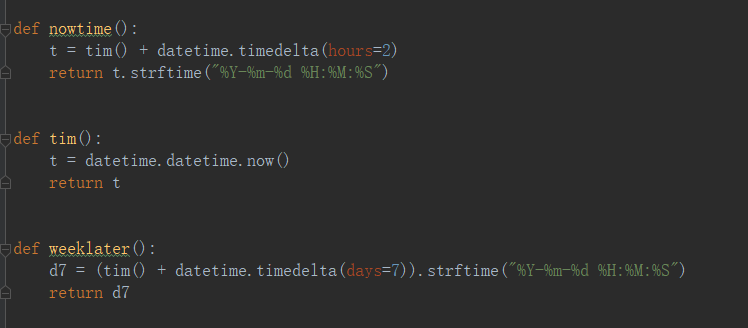環(huán)境搭建:
下載python3.8的安裝包 https://www.python.org/downloads/windows/
下載IDE,使用的pycharm :https://www.jetbrains.com/pycharm/download/#section=windows
安裝框架 pip install httprunner
完成以上步驟,環(huán)境搭建完畢
-----------------------------------------------------------------------------------
第一步:搭建項(xiàng)目
使用手腳架
httprunner startproject test
在會(huì)在當(dāng)前目錄下搭建項(xiàng)目,并生成目錄結(jié)構(gòu)如下:

testcases目錄存放測(cè)試用例
在debugtalk.py 文件中進(jìn)行自定義方法編寫
.env 文件用于存放環(huán)境變量例如 用戶名/密碼等
reports目錄存放測(cè)試報(bào)告
第二步:生產(chǎn)測(cè)試用例
只介紹py文件測(cè)試用例,json和yaml文件可以在網(wǎng)上找到很多教程
可以使用抓包工具charles/fiddler對(duì)接口請(qǐng)求抓包
如下圖是charles實(shí)例:

導(dǎo)出har文件后,在保存文件的目錄下執(zhí)行
har2case test.har

將在當(dāng)前目錄下生產(chǎn)test_test.py的測(cè)試用例文件

將test_test.py 轉(zhuǎn)移到項(xiàng)目的testcases目錄下
第三步:在debugtalk.py文件中自定義方法,如下截圖

第四步:優(yōu)化測(cè)試用例(testcases目錄下的文件)
class TestCaseTest(HttpRunner): config = Config("測(cè)試") \ .variables( **{ "base_url": "${baseurl()}", "tim": "${tim()}" } ).verify(False) teststeps = [ #POST請(qǐng)求 Step( RunRequest("teststep1") .with_variables( **{ "url": "/test/test", "now": "${nowtime()}", "tim": "$tim", "para": {"test": "test"} }", } ) .post( "https://$base_url$url" ) .with_headers( **{ "now": "$now", "Connection": "Keep-Alive", "Accept-Encoding": "gzip", "User-Agent": "okhttp/4.2.2"} ) .with_json( "$para" ) .validate() .assert_equal("status_code", 200) .assert_equal("description", "SUCCESS") .assert_equal("resultcode", "0") ), # GET請(qǐng)求 Step( RunRequest("teststep2") .with_variables( **{ "url": "test", "para": {}, "now": "${nowtime()}", }" } ) .get("https://$base_url$url") .with_params(**{}) .with_headers( **{ "now": "$now", "accept-language": "zh-Hans-AZ;q=1", "accept": "*/*", "content-type": "application/json;", "enterpriseid": "CC01", "accept-encoding": "gzip, deflate, br", } ) .validate() .assert_equal("status_code", 200) .assert_equal("resultcode", "0") ), ]
第六步:測(cè)試用例詳解
1、調(diào)用debugtalk.py中的方法,使用格式
${nowtime()}
2、如下:test是當(dāng)前測(cè)試用例的名稱
Config("test")
3、如下:variables定義整個(gè)測(cè)試用例的共用參數(shù)
Config("測(cè)試") \ .variables( **{ "base_url": "${baseurl()}", "tim": "${tim()}" }
4、如下:verify專門是用于https請(qǐng)求取消對(duì)服務(wù)端證書校驗(yàn),默認(rèn)值是True(校驗(yàn)服務(wù)端證書),指定False(不校驗(yàn)服務(wù)端證書)
config = Config("測(cè)試") \ .variables( **{ "base_url": "${baseurl()}", "tim": "${tim()}" } ).verify(False)
5、如下,Step測(cè)試步驟,需要嚴(yán)格按照如下格式編寫
RunRequest ("teststep1") RunRequest 測(cè)試步驟執(zhí)行關(guān)鍵字,teststep1是測(cè)試步驟名稱
with_variables與config中的variables類似,定義當(dāng)前測(cè)試步驟中使用的參數(shù)
用例中公用參數(shù),調(diào)用方式
"tim": "$tim"
post請(qǐng)求;post(url)
Step( RunRequest("teststep1") .with_variables( **{ "url": "/test/test", "now": "${nowtime()}", "tim": "$tim", "para": {"test": "test"} }", } ) .post( "https://$base_url$url" ) .with_headers( **{ "now": "$now", "Connection": "Keep-Alive", "Accept-Encoding": "gzip", "User-Agent": "okhttp/4.2.2"} ) .with_json( "$para" ) .validate() .assert_equal("status_code", 200) .assert_equal("description", "SUCCESS") .assert_equal("resultcode", "0") ),
with_headers 請(qǐng)求的頭文件;with_json 請(qǐng)求參數(shù);validate斷言標(biāo)識(shí),assert_equal具體斷言內(nèi)容,還有其他斷言類型可以參看源碼;
get請(qǐng)求;get(url)
Step( RunRequest("teststep2") .with_variables( **{ "url": "test", "para": {"test":"test"}, "now": "${nowtime()}", }" } ) .get("https://$base_url$url") .with_params(**{"test":"test"}) .with_headers( **{ "now": "$now", "accept-language": "zh-Hans-AZ;q=1", "accept": "*/*", "content-type": "application/json;", "enterpriseid": "CC01", "accept-encoding": "gzip, deflate, br", } ) .validate() .assert_equal("status_code", 200) .assert_equal("resultcode", "0") ),
with_params 請(qǐng)求參數(shù)
獲取接口返回?cái)?shù)據(jù),使用extract().with_jmespath("body.data","data");body.data是獲取接口返回的數(shù)據(jù)路徑,data是自定義的參數(shù)名,用于其他step調(diào)用;如下格式:
Step( RunRequest("teststep1") .with_variables( **{ "url": "test", "para":{"test":"test"} } ) .post( "https://$base_url$url" ) .with_headers( **{ "Content-Type": "application/json;charset=UTF-8", "Content-Length": "82", "Connection": "Keep-Alive", "Accept-Encoding": "gzip", "User-Agent": "okhttp/4.2.2" } ) .with_json( "$para" ) .extract().with_jmespath("body.data","data") .validate() .assert_equal("status_code", 200) .assert_equal("data", "$data") ),
第七步:測(cè)試用例執(zhí)行,在項(xiàng)目根目錄下執(zhí)行,將測(cè)試報(bào)告保存在reports/test.html中,--self-contained-html 參數(shù)限定生成獨(dú)立的報(bào)告(可以直接將html文件分享)
hrun testcases --html=reports/test.html --self-contained-html

根據(jù)實(shí)際使用情況,總結(jié)以上知識(shí)點(diǎn)備忘!



 浙公網(wǎng)安備 33010602011771號(hào)
浙公網(wǎng)安備 33010602011771號(hào)